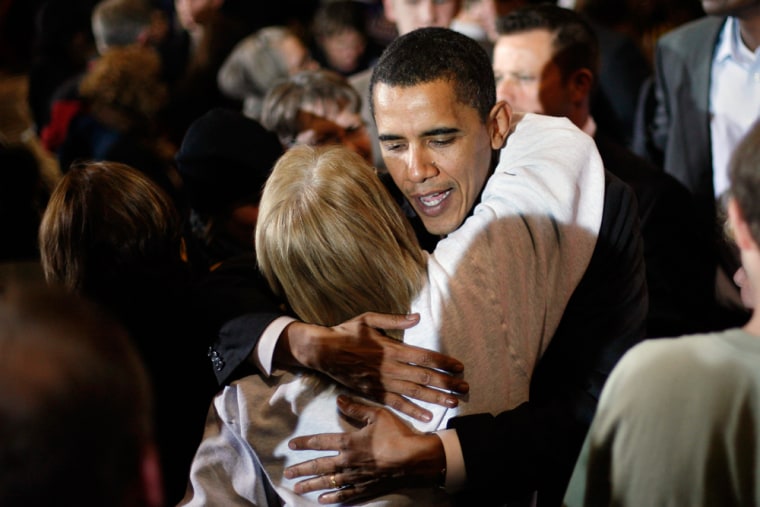It's all about turning out voters now.
After a year of stump speeches, TV ads and face-to-face politicking, presidential get-out-the-vote operations are in overdrive in the final hours before Iowa's caucuses. Campaigns largely are relying on traditional methods, what one operative terms the "knock-and-drag" approach — knock on doors and drag voters to the caucuses.
"Whenever it's a close race, a strong organization matters. It can make a difference," said Terry Nelson, a veteran strategist from President Bush's 2004 re-election race who has deep roots in Iowa politics.
Close races indeed.
Democrats Hillary Rodham Clinton, Barack Obama and John Edwards are locked in a three-way fight. Mike Huckabee and Mitt Romney are battling on the Republican side.
The candidates themselves are appealing to voters in closing TV and radio ads and at personal appearances across the state.
"I need your help. I'm in a real tight battle here. So I need you to go out and caucus, and get out there and vote for me," Romney, a former Massachusetts governor, told backers in Newton over the weekend. Teasing, he said: "I'm told it's going to be about 75 or 80 degrees, a very nice day to go caucus. There's nothing on TV. Just the Orange Bowl."
Obama, a senator from neighboring Illinois, went so far as to call two of his Marion County, Iowa, organizers on stage so he could introduce them to an audience. "Their job is to get you to caucus," he said. "My job is to be so persuasive ... that you conclude 'I've got to go for Obama. That's my guy.'"
Candidates in both parties are fighting over a small pool of voters in Iowa; about 120,000 to 150,000 people are expected to vote in the Democratic caucuses, while 80,000 to 90,000 are likely to participate in the GOP contest.
So it could take relatively few people to give a candidate an edge — and that's where the final push for votes comes into play.
"When the denominator is as small as the likely number of caucusgoers, the ability to find or turn out 3,000 or 4,000 people, which a good organization should be able to do, can be a determining factor," said Ken Mehlman, Bush's 2004 campaign manager and a former Republican National Committee chairman.
His proteges are divided among all of the Republican presidential campaigns. Thus, the GOP campaigns are employing some of the same tactics of the RNC's own 72-hour turnout program to identify on-the-fence voters and get them to commit in the final hours of the campaign.
Among Republicans, Romney's operation is by far the strongest; one strategist likened it to a traditional operation on steroids. He has spent millions of dollars and more than a year identifying thousands of likely caucusgoers and supporters, and testing his campaign's ability to get them to show up.
In the homestretch, Romney has dispatched hundreds of volunteers across the state to make phone calls and knock on doors, with the goal of reaching all identified Romney backers multiple times in the coming days. Aides are mindful that their volunteers must walk a fine line between encouraging people and annoying them.
Romney's main Iowa competitor, Huckabee, lags considerably when it comes to such an operation. Huckabee's aides argue that message will matter more than money and manpower come Thursday.
Teams of volunteers at Huckabee headquarters are calling voters identified as likely to caucus for him. But much of the heavy lifting appears to have been outsourced to networks of home schoolers, pastors, gun-rights advocates and backers of a national sales tax. Huckabee's campaign insists such groups are operating independently of him.
In recent days, a trio of religious leaders who support Huckabee, an ordained Southern Baptist preacher who has the backing of many evangelicals, held a conference call with Iowa pastors to encourage them to use their services to boost Christian voters' participation. Another group, called TrustHuckabee, claims it has identified about 30,000 homes in Iowa that are for Huckabee, and it is doing phone banking for him.
On the Democratic side, Clinton, Obama and Edwards, have developed some of the most sophisticated turnout programs that have ever been seen in Iowa.
Clinton and Obama are each trying to expand the universe of caucusgoers — she is hoping to attract newcomers who are older and female, while Obama is banking on those who are younger and male. Edwards, meanwhile, is targeting supporters who have reliably caucused in the past.
Thus, a higher turnout may benefit Obama or Clinton while a lower turnout could work to Edwards' advantage.
All three have spent the course of the year identifying their backers through phone calls and direct contact. Organizers for each candidate will begin placing calls first thing Thursday morning to backers in each precinct to make sure they still plan to attend the caucus. The campaigns each have hundreds of staff and volunteers prepared to offer rides, food and child care to those who need help getting to the caucus.
Clinton strategists have also created an elaborate buddy system, pairing neighbors with neighbors and experienced caucusgoers with newcomers. Obama has a similar networking system.
Caucus doors open at 7:30 p.m. EST Thursday night, and no one is admitted inside after 8. Because that leaves such a small window of time for the campaigns to figure out if their supporters have actually shown up, they are inviting supporters to pre-caucus parties beginning at 6:30 p.m. to give organizers more time to identify and track down the no-shows.
